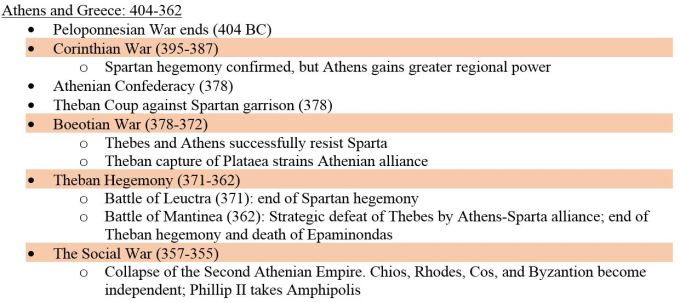
By N.
Classical Athens is a common subject of study. Rising to prominence among the Greek city states, Athens exerted cultural and economic control throughout the Greek world. Home to many of the most famous figures of Ancient history, the classical city-state produced Pericles, Socrates, Plato and other famous individuals. However, after Athen’s defeat during the Peloponneisan War (431-404 BC), the city’s political history is often overlooked. Although no longer the center of a regional empire, Athens was still was an economic and cultural center of Greece. The following is a brief overview of Athenian political life after 404 and before the entry of Rome into the eastern Mediterranean.
Athens and Greece- from 404 BC to the Macedonian Invasion (356)
The Peloponnesian War resulted in the loss of Athen’s empire, and Sparta became the chief power (hegemon) among the Greek cities. For the next 50 years, Athens would struggle to regain her former political influence, bringing the city-state again into conflict with her arch-rival Sparta. After further conflict with a new Theban hegemony (362), all of Greece became vulnerable to a rising northern power.

Immediately after the war, Athens was forced into becoming a “subject-ally” of Sparta and had its democracy abolished. Sparta was always unhappy with Athenian democracy and sought to replace it with a more familiar form of government. The Spartan-approved Thirty Tyrants ruled Athens as oligarchs, though their reign was short lived- Athens was again a democracy by 403.